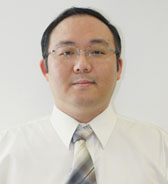|

|
A/Prof. Da-Wei Zhang (张大为)
Division of Chemistry and Biological Chemistry
Nanyang Technological University, Singapore
Email: dawei53@gmail.com
|
Abstract: During protein folding, protein undergoes large conformational changes. Its electronic structure is very conformation-dependent. Fixed atomic charges may not be always accurate for the whole folding trajectory. Thus, the atomic charges need to respond to the conformational change of protein. In this presentation, I will introduce our recent works1-6 in the development and application of a charge variation scheme labeled adaptive hydrogen bond-specific charge (AHBC). This scheme employs on-the-fly charge fitting through which the atomic charges of amino acids involved in the formation and disruption of backbone hydrogen bonds during the folding process are periodically updated by treating these amino acids with fragment quantum mechanical calculations.7, 8 The derived atomic charges will then simply replace the standard charges from the Amber force field while the rest of the Amber parameters are kept the same. With the implementation of AHBC scheme, the polarizability of the backbone hydrogen bonds are considered thus leading towards the stabilization of the hydrogen bonds which is crucial in the folding of secondary structures such as α-helices.
About the Speaker: Zhang Dawei obtained his Ph.D. in Theoretical/Computational Chemistry from New York University Chemistry Department under Professor John Z.H. Zhang, developing a new algorithm to calculate the ab initio interaction energy between protein and drug molecule. After graduation in 2005, he worked as postdoctoral fellow and assistant research scientist under Prof. Sylvia Lee-Huang at New York University Langone Medical Center, Department of Biochemistry. His postdoctoral research focused on the discovery of natural anti-HIV and anti-obesity agents. His role is to identify the key components in plant extract using molecular docking simulation and examine their biological activities experimentally to confirm modeling predictions. This work represents a novel new field that merges computational chemistry, structural biology, bioinformatics, viral pathogenesis for rational development and targeted design of smart drugs. He joined NTU in June 2008.
Date&Time: June 14, 2013 (Friday),10:30 -11:30 a.m.
Location: 606 Conference Room 

